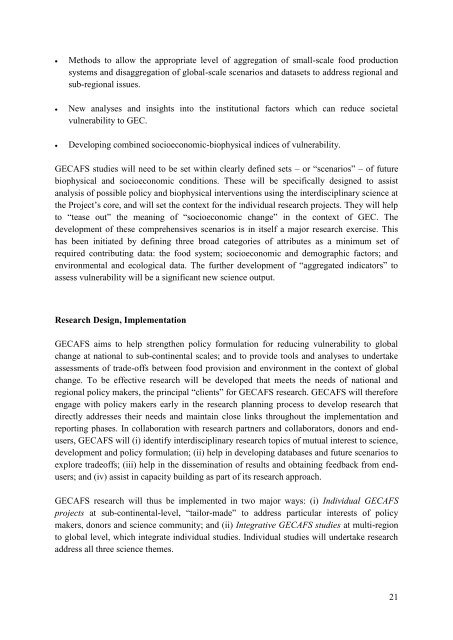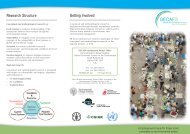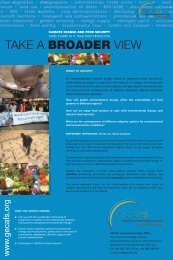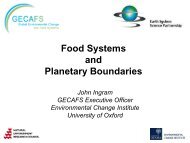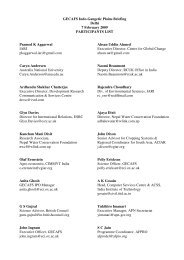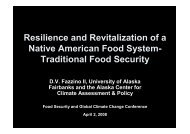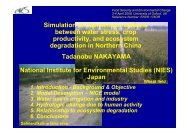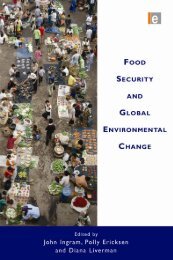From Food Production to Food Security - Global Environmental ...
From Food Production to Food Security - Global Environmental ...
From Food Production to Food Security - Global Environmental ...
- No tags were found...
Create successful ePaper yourself
Turn your PDF publications into a flip-book with our unique Google optimized e-Paper software.
Methods <strong>to</strong> allow the appropriate level of aggregation of small-scale food productionsystems and disaggregation of global-scale scenarios and datasets <strong>to</strong> address regional andsub-regional issues.New analyses and insights in<strong>to</strong> the institutional fac<strong>to</strong>rs which can reduce societalvulnerability <strong>to</strong> GEC.Developing combined socioeconomic-biophysical indices of vulnerability.GECAFS studies will need <strong>to</strong> be set within clearly defined sets – or “scenarios” – of futurebiophysical and socioeconomic conditions. These will be specifically designed <strong>to</strong> assistanalysis of possible policy and biophysical interventions using the interdisciplinary science atthe Project’s core, and will set the context for the individual research projects. They will help<strong>to</strong> “tease out” the meaning of “socioeconomic change” in the context of GEC. Thedevelopment of these comprehensives scenarios is in itself a major research exercise. Thishas been initiated by defining three broad categories of attributes as a minimum set ofrequired contributing data: the food system; socioeconomic and demographic fac<strong>to</strong>rs; andenvironmental and ecological data. The further development of “aggregated indica<strong>to</strong>rs” <strong>to</strong>assess vulnerability will be a significant new science output.Research Design, ImplementationGECAFS aims <strong>to</strong> help strengthen policy formulation for reducing vulnerability <strong>to</strong> globalchange at national <strong>to</strong> sub-continental scales; and <strong>to</strong> provide <strong>to</strong>ols and analyses <strong>to</strong> undertakeassessments of trade-offs between food provision and environment in the context of globalchange. To be effective research will be developed that meets the needs of national andregional policy makers, the principal “clients” for GECAFS research. GECAFS will thereforeengage with policy makers early in the research planning process <strong>to</strong> develop research thatdirectly addresses their needs and maintain close links throughout the implementation andreporting phases. In collaboration with research partners and collabora<strong>to</strong>rs, donors and endusers,GECAFS will (i) identify interdisciplinary research <strong>to</strong>pics of mutual interest <strong>to</strong> science,development and policy formulation; (ii) help in developing databases and future scenarios <strong>to</strong>explore tradeoffs; (iii) help in the dissemination of results and obtaining feedback from endusers;and (iv) assist in capacity building as part of its research approach.GECAFS research will thus be implemented in two major ways: (i) Individual GECAFSprojects at sub-continental-level, “tailor-made” <strong>to</strong> address particular interests of policymakers, donors and science community; and (ii) Integrative GECAFS studies at multi-region<strong>to</strong> global level, which integrate individual studies. Individual studies will undertake researchaddress all three science themes.21


